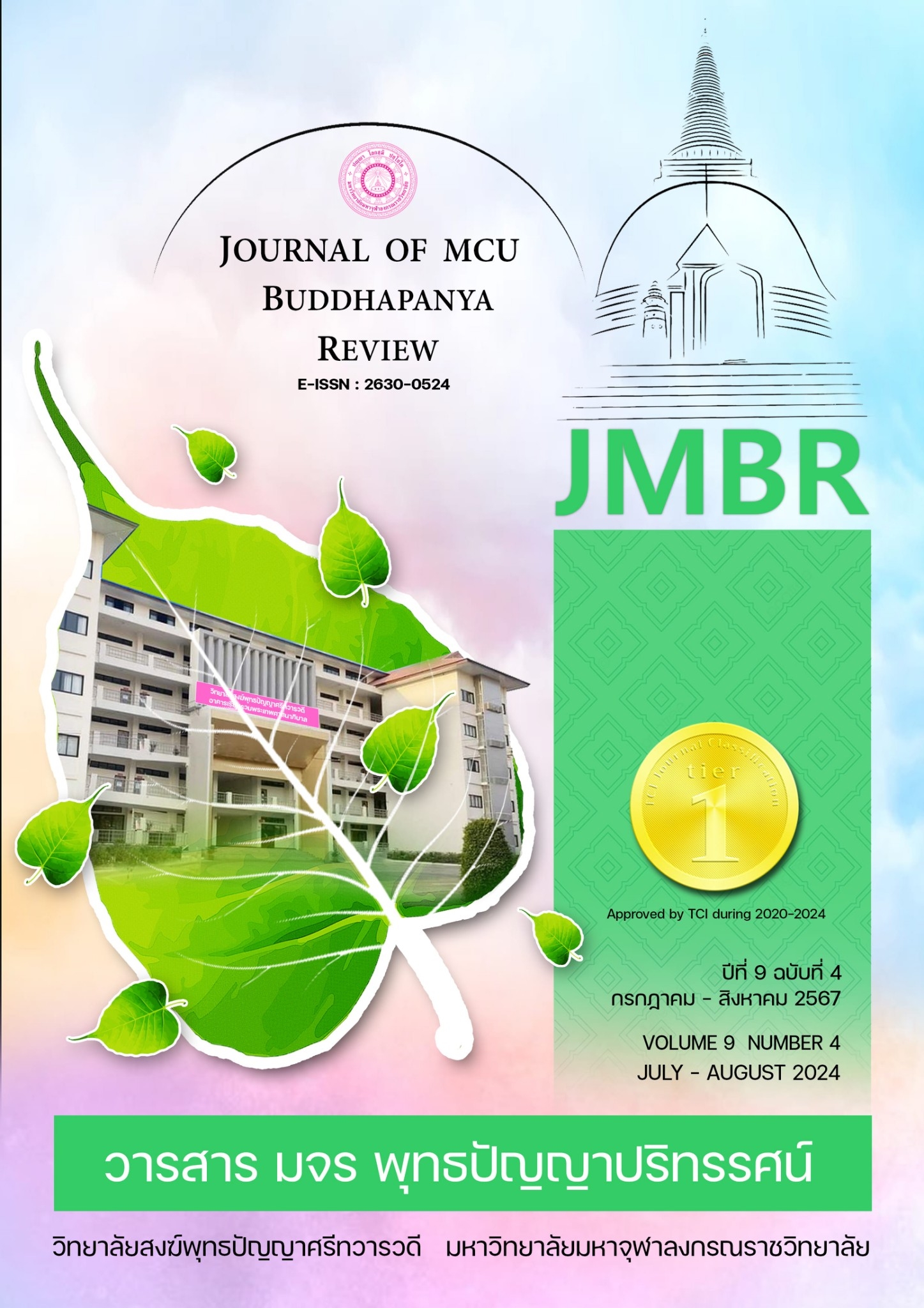แนวทางในการคุ้มครองและการสงเคราะห์รูปแบบการฝึกอบรมอาชีพสำหรับผู้ต้องขัง และผู้ได้รับการปล่อยตัว
คำสำคัญ:
ผู้ต้องขัง, ผู้ได้รับการปล่อยตัว, การฝึกอบรมอาชีพบทคัดย่อ
งานวิจัยนี้มีวัตถุประสงค์เพื่อศึกษา 1) การคุ้มครองและการสงเคราะห์รูปแบบการฝึกอบรมอาชีพสำหรับกลุ่มผู้ต้องขังและผู้ได้รับการปล่อยตัว 2) ปัจจัยที่มีผลต่อการจัดการคุ้มครองและการสงเคราะห์รูปแบบการฝึกอบรมอาชีพสำหรับกลุ่มผู้ต้องขังและกลุ่มผู้ได้รับการปล่อยตัว 3) อุปสรรคของการจัดการคุ้มครองและการสงเคราะห์รูปแบบการฝึกอบรมอาชีพสำหรับผู้ต้องขังและผู้ได้รับการปล่อยตัว งานวิจัยนี้เป็นการวิจัยเชิงคุณภาพ ได้ศึกษาแนวคิดการคุ้มครองและการสงเคราะห์ แนวคิดการฝึกอบรมอาชีพ และทฤษฎีลงโทษผู้กระทำผิดเพื่อการแก้ไขฟื้นฟู โดยกลุ่มผู้ที่ให้ข้อมูลในงานวิจัยนี้เลือกแบบเฉพาะเจาะจง คือ บุคลากรเรือนจำกลางขอนแก่น และเรือนจำอำเภอพล ขอนแก่น จำนวน 10 คน และผู้ต้องขังที่ได้รับการปล่อยตัว จำนวน 10 คน โดยเครื่องมือที่ใช้สำหรับการเก็บรวบรวมข้อมูล คือ รูปแบบการสัมภาษณ์เชิงลึก ใช้วิธีการวิเคราะห์ข้อมูลเชิงพรรณนา
ผลการวิจัย พบว่า 1) เรือนจำมีรูปแบบการพัฒนาพฤตินิสัยผู้ต้องขังด้วยโปรแกรมการฝึกอบรมอาชีพ โดยมุ่งเน้นการฝึกวิชาชีพที่ผู้ต้องขังสนใจ ทำให้ผู้ต้องขังได้เสริมสร้างองค์ความรู้ทางอาชีพด้านต่าง ๆ ให้มีทักษะทางการทำงาน 2) ปัจจัยที่มีผลต่อรูปแบบการฝึกอบรมอาชีพ โดยมีเครือข่ายที่ร่วมมือกับเรือนจำ เช่น กรมพัฒนาฝีมือแรงงานและวิทยาลัยการอาชีพ ซึ่งเข้ามาให้ความรู้และเพิ่มทักษะทางอาชีพ ทำให้เพิ่มมิติทางอาชีพที่หลากหลายแก่ผู้ต้องขัง 3) อุปสรรคของการฝึกอบรมอาชีพ ได้แก่ เนื้อหาหลักสูตร ไม่สอดคล้องกับความต้องการของตลาดแรงงานในปัจจุบัน มีข้อจำกัดด้านทรัพยากรที่จำเป็นในเรือนจำ ทั้งบุคลากรและสิ่งของจำเป็น ขนาดของเรือนจำที่ไม่เหมาะสม ควรมีการพัฒนารูปแบบการฝึกอาชีพที่ทันสมัยและเป็นที่ต้องการของตลาดแรงงาน รวมถึงการพัฒนาทรัพยากรภายในเรือนจำให้เหมาะสมและสอดคล้องกับจำนวนผู้ต้องขังเป็นหลัก
เอกสารอ้างอิง
Arwakul, V. (1997). Trianing: Training and personal development manual. 2nd ed., Bangkok: Chulalongkorn University Printing House.
Department of Corrections. (2005). Annual Action Plan 2005. From http://www.correct.go.th/cop-Bank/page_15.htm.
Department of Corrections. (2012). United Nations Rules for the Treatment of Women Prisoners and Non-Custodial Measures for Women Offenders. from https://www.psclib.com/pti/opac_css/index.php?IvI=publisher_see&id=143.
Department of Corrections. (2014). Organizational Governance: Correctional Operations Action Plan 2014. Department of Corrections, chapter 1 Ngor., Pages 4-9.
Ingkhasaramanee, P. (2008). Problems with the inmates' rehabilitation program in the Department of Corrections. Master of Social Work Program in Social Welfare Administration and Policy, Faculty of Social Administration, Thammasat University.
Institute for Skill Development. (2019). Vocational training. from https://www.dsd.go.th.
Juntaramanee, W., Poungkaew, P., and Muangprasit, P. (2020). A Study of the Operational Results of Tiled Vocational Training Course for Male Prisoners:A Case Study of Chiang Mai Central Prison. Journal of Humanities and Social Sciences; 2020, 9(2), 24-37.
Lertpanichpun, S. (2017). Guidelines for developing Legal Protection of Rights and Assistance of Ex-Offenders in Thailand. Journal of Social Work, 24(2), 193-226.
Nakfon. P. (2019). Welfare for Thai Inmates. Journal of Social Sciences Srinakharinwirot University, 22(1), 74-89.
Ngernklay, P., and Srisomsap, P. (2016). The Study of Ex-convicts support organization project. Journal of Thai Justice System, 9(2), pages 45-61.
Panyanee, W. (2021). Vocational Training for Prisoners’ Rehabilitation under Thai Penalty Law. Journal of Nakhon Ratchasima College Humanities and Social Sciences, 15(2), 42-42.
Saengcharoensap, K. (2021). Prison privatization to create careers for Prisoners and after their acquittal. Rangsit Journal of Law and Society, 3(3), 60-73.
Sereerat, S., and Hirankitti, S. (2002). Office Management: New office management. from http://Iibrary.nhrc.or.th/ULIB/dublin.php?ID=4673.
Silarat, N., Boonsathorn, W. (2019). Factors and Benefit for Organizations in Hiring Former Convicts to Work in Organizations. Graduate School of Human Resource Development, National Institute of Development Administration. from https://so01.tci-thaijo.org/index.php/HRODJ/article/download/152158/156944.
Sriwannawit, C., Sutthinarakorn, W., Jeerapattanatorn, P. and Khomsod, S. (2021). Vocational Process for a Better life Preparation of Prisoners after Imprisonment. Philosophy, Faculty of Education, KasetsartUniversity, Bangkok.
Suttiyotin, N. (2015). Criminology Throry (Unit 6). Criminal Law and Criminology, Sukhothai Thammathirat Open University.
Vasboonma, C. (2003). Motivation and self-actualization need to be members of board of basic educational commission. Master of Education, Department of Educational Administeation, Graduate School, Silpakorn University.
ดาวน์โหลด
เผยแพร่แล้ว
รูปแบบการอ้างอิง
ฉบับ
ประเภทบทความ
สัญญาอนุญาต
ลิขสิทธิ์ (c) 2024 วารสาร มจร พุทธปัญญาปริทรรศน์

อนุญาตภายใต้เงื่อนไข Creative Commons Attribution-NonCommercial-NoDerivatives 4.0 International License.



